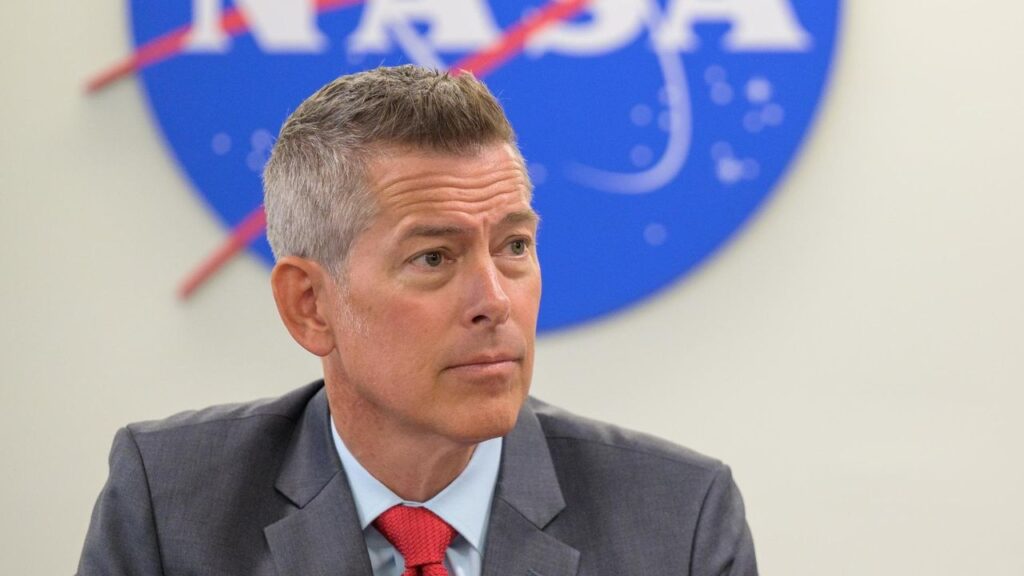
NASA’s acting administrator, Sean Duffy, has firmly asserted the agency’s determination to lead in the race to return humans to the moon, countering concerns about the United States falling behind China. During an internal town hall meeting on September 4, 2023, Duffy responded to testimony from a Senate hearing that hinted at China’s potential to land astronauts at the lunar south pole ahead of the U.S. He stated, “I’ll be damned if that is the story that we write. We are going to beat the Chinese to the moon. We are going to do it safely. We’re going to do it fast. We’re going to do it right.”
His remarks followed a Senate Commerce Committee hearing on September 3, titled “There’s a Bad Moon on the Rise,” where several experts voiced concerns over China’s advancing lunar capabilities. Former NASA Administrator Jim Bridenstine and Mike Gold, the former acting associate administrator for NASA’s Office of International and Interagency Relations, cautioned that delays in the U.S. Artemis program could allow China to define the future of lunar exploration.
The Artemis program is NASA’s strategy to return astronauts to the moon, with Artemis 2 planned as the first crewed test flight of the Orion spacecraft. This mission aims to carry astronauts, including Reid Wiseman, Christina Koch, Victor Glover, and Canadian Space Agency astronaut Jeremy Hansen, on a lunar flyby. Artemis 2 is scheduled to launch no earlier than February 2026.
If successful, Artemis 3 will mark the first time astronauts land on the moon since the Apollo missions, specifically targeting the lunar south pole with a launch planned for 2027. Nonetheless, uncertainty remains regarding whether this timeline will be met, especially as China progresses with its own lunar ambitions.
At the Senate hearing, Bridenstine expressed skepticism, stating, “It is highly unlikely that we will land on the moon before China.” Both he and Gold highlighted how delays in the Artemis program and budgetary uncertainties could hinder U.S. efforts in lunar exploration. Gold warned that if China were to establish a presence on the moon first, it could lead to profound implications for U.S. interests, affecting the economy, national security, and international relations.
In contrast, Duffy projected confidence during the town hall, dismissing the notion that NASA would fail in its lunar mission. He noted, “NASA won’t beat China to the moon,” as a direct rebuttal to the previous day’s testimony, emphasizing that such statements were “shade thrown on all of NASA.”
Duffy discussed the support of the Trump administration for the Artemis program despite broader budget challenges facing NASA. The fiscal year 2026 budget proposed a historic cut of 24% to NASA’s funding, affecting many agency programs. Nevertheless, Congress has since restored funding to match the previous year’s allocations, although final decisions are still pending.
Duffy highlighted the importance of the Artemis program in the context of U.S. national ambitions, echoing President Trump’s statement about pursuing “a manifest destiny to the stars.” This phrase, historically associated with U.S. expansionism, has faced criticism but reflects the administration’s commitment to space exploration.
During the town hall, Duffy was joined by newly appointed NASA Associate Administrator Amit Kshatriya, who emphasized the necessity for NASA to focus on public service. Kshatriya stated, “We don’t work for profit. We work for the people,” reiterating the obligation to deliver results for taxpayers. He stressed that agency leaders must be accountable for their missions and be prepared to step aside if they cannot meet expectations.
Kshatriya advocated for a cultural shift within NASA, urging staff to prioritize action over analysis. “We want you to have the black pen, not the red pen,” he remarked, underscoring the need for a proactive approach to achieve mission goals.
In response to concerns about project cuts and layoffs, which have seen nearly 4,000 employees leave NASA due to the Trump administration’s “deferred resignation program,” Duffy reassured staff that space exploration funding remains a priority. “I think we have enough money to accomplish our mission,” he stated, referring specifically to the Artemis program. He acknowledged the need for cost reduction, noting that the current operational cost of $4 billion per launch presents significant challenges for sustaining a moon program.
Kshatriya reinforced that every initiative at NASA should align with advancing the Artemis program, Mars missions, or scientific endeavors that support human exploration. He highlighted the importance of efficiency and success across all agency functions, emphasizing that even indirect contributions support the overall mission.
Duffy concluded by calling for unity and commitment from the NASA workforce, recognizing the pressure the agency faces as it seeks to reclaim its historical leadership in space exploration. “We need all of you. We need this team, this intelligence, this drive,” he urged, vowing that NASA will not allow its legacy to be defined by losing the second space race.







